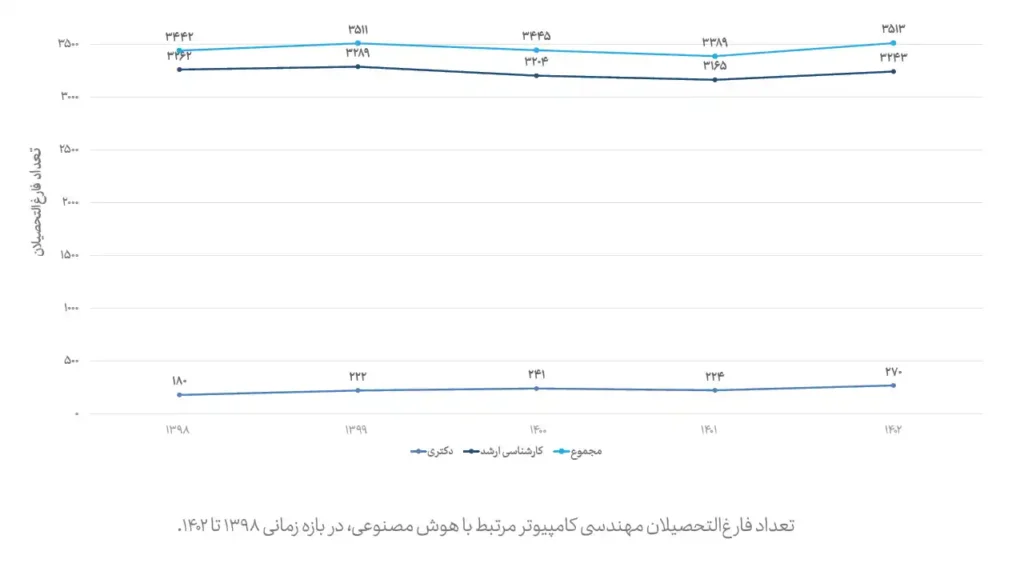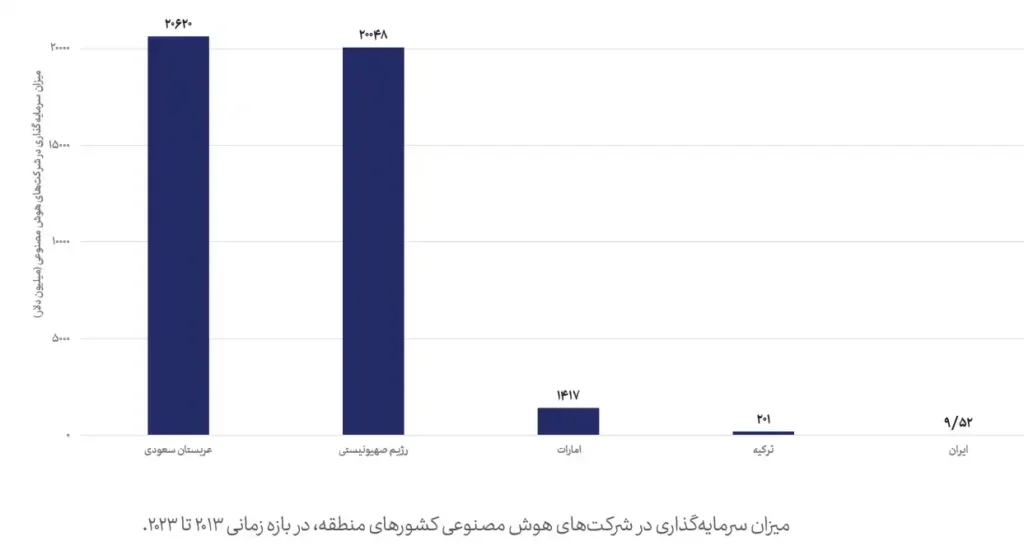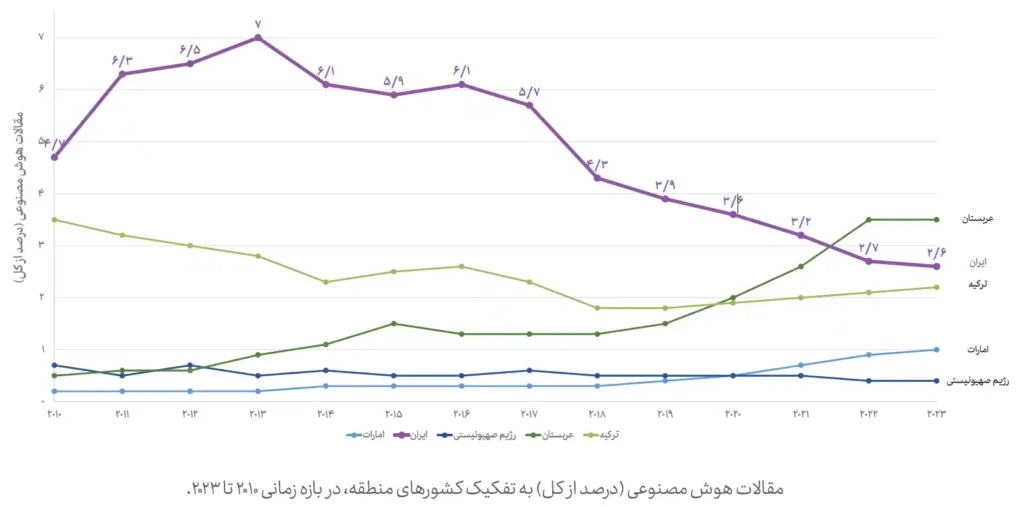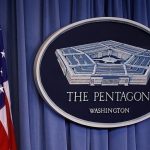Iran’s artificial intelligence index report 1403 provides a comprehensive and data-driven picture of Iran’s situation in the field of artificial intelligence technologies. Based on the seven model of the technological innovation system, this report has examined various dimensions of knowledge development, knowledge dissemination, commercialization, market, investment and governance and analyzed the position of Iran in comparison with the countries of the region and the world. While Iran is facing serious challenges such as weak infrastructure, lack of expert personnel and legal loopholes, it also has opportunities for improvement and progress in this field.
Global developments of artificial intelligence and the position of Iran
Artificial intelligence as a pivotal technology is reshaping global economies. From applications in medicine and health to industrial and transportation innovations, this technology has been able to accelerate productivity and growth in various sectors. Countries like China and the United States have turned themselves into global AI hubs with large investments, targeted policies, and strong infrastructure.
Iran, realizing the importance of this technological development, has evaluated its situation in this area. Iran’s artificial intelligence index report 1403, prepared by Sharif University of Technology in collaboration with research and government centers, tries to identify the country’s strengths, weaknesses, and progress paths by providing a data-driven framework. This report examines Iran’s situation in the seven main functions of the technological innovation system and tries to provide practical recommendations for improvement by comparing the country with selected and leading regional countries.
Iran’s decline in knowledge production; From the second place in the region to the risk of further relegation
In the last decade, Iran was one of the leading countries in the region in the production of artificial intelligence knowledge. However, this position has gradually weakened. According to the report, in 2023, Iran was ranked second in the region in terms of the number and quality of scientific articles, and it is expected to cede this position to Türkiye.
The number of Iranian artificial intelligence articles has decreased in recent years, and the country’s share of high-impact articles has also reached 3.2 percent. Meanwhile, countries in the region such as Saudi Arabia and the United Arab Emirates have made significant progress by investing in international cooperation and patent registration. In the field of scientific cooperation, Iran is also limited to Türkiye and its interactions with leading countries such as China and India have been very limited.
Lack of expert manpower and its effect on the commercialization of artificial intelligence in Iran
One of the most important challenges in Iran in the development of artificial intelligence is the lack of expert personnel. Although about 3,500 graduates in master’s and doctoral degrees in fields related to artificial intelligence leave the country’s universities every year, a significant part of them do not remain active in this field due to migration or the lack of suitable job opportunities in the country.


This issue has caused the adoption rate of artificial intelligence in Iranian businesses to be very low. Only 17% of Iranian companies use this technology, which is seven years behind the global average. On the other hand, the lack of suitable data and processing infrastructure is a serious obstacle for the expansion of artificial intelligence in various industries of Iran.
Economic challenges of Iran’s artificial intelligence market
The market value of artificial intelligence in Iran until 1403 is estimated at about 1600 billion tomans. However, this market faces serious challenges. The growth of this market has been very limited under the influence of economic factors such as inflation and lack of domestic and foreign investments.
Among the countries in the region, Iran has had the lowest amount of investment in the field of artificial intelligence. While countries such as Saudi Arabia and the United Arab Emirates have allocated huge budgets to infrastructure development and support for AI startups, Iran is still lagging behind due to financial constraints and lack of incentive policies.


artificial intelligence governance; The need for clear legal frameworks
One of Iran’s key weaknesses in the field of artificial intelligence is the lack of legal and ethical frameworks. Iran ranks fifth among countries in the region in terms of governance and data protection indicators. The lack of clear laws in the field of privacy and data protection is an important obstacle to gaining public trust and wider acceptance of this technology in the country.
On the other hand, the social acceptance of artificial intelligence is also low due to the lack of public awareness of its benefits and risks. This issue doubles the need for educational campaigns and awareness programs.
Suggestions for the future of artificial intelligence in Iran
According to the identified weaknesses and strengths, Iran needs urgent and targeted measures to exploit the capabilities of artificial intelligence. Some of the key suggestions are:
- Increasing investment in education and research: Creating advanced training programs to cultivate a skilled workforce and support academic research projects.
- Development of data and processing infrastructure: Establishing national data centers and facilitating access to advanced processors.
- Strengthening international cooperation: Signing scientific and economic agreements with leading and regional countries.
- Development of transparent legal frameworks: Enact laws to protect data, privacy and promote ethics in the field of artificial intelligence.
- Support for startups: Creating specialized investment funds and providing tax relief for businesses active in the field of artificial intelligence.
Necessary steps for Iran’s participation in the global artificial intelligence competition
The report of Iran’s artificial intelligence index 1403 shows the many challenges and unique opportunities that exist in this field for the country. By adopting the right policies, Iran can achieve a worthy position in the world competition. Among the necessary measures, we can mention strengthening education, developing infrastructure, increasing investment, improving laws and expanding international cooperation.
In today’s world, artificial intelligence is no longer an option, but a necessity. Iran can play its role in this technological revolution and achieve sustainable growth and development by exploiting its internal capacities and interacting with the international community.
RCO NEWS


















